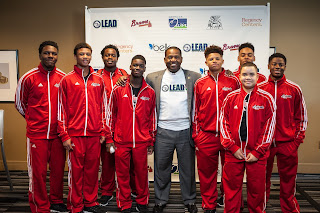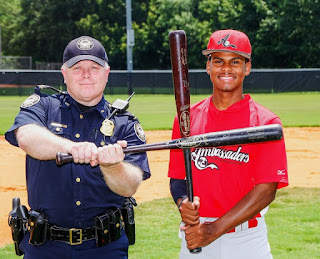I took advantage of many opportunities to learn from life’s experiences this year, and it turned out to be an awesome year! I kept myself open to learning whether it was through my participation in Leadership Atlanta, or relocating with my family from Cherokee County to closer, familiar surroundings in Atlanta. I must admit though, nowhere did I find life’s learning opportunities more evident and abundant than in my work with my L.E.A.D. (Launch, Expose, Advise, Direct) Ambassadors.
Over the years, I have come to appreciate the time I spend with the Ambassadors because of what I learn from them. My wife Kelli and I started L.E.A.D. in 2007 and, every year, our Ambassadors have been teaching me what it takes to inspire and empower Atlanta’s young, Black, inner-city males to live a sustainable life of significance. 2015 has been no different in that regard, and I’d like to share with you three things that I’ve learned from our L.E.A.D. Ambassadors this year.
1. Black Boys want a hero, more than they need a coach.
We live in a time where Black Males have a better chance of being incarcerated than graduating from high school. Where their lives are expendable after thoughts of those in society who are supposed to protect them. Make no mistakes about it, Black Boys in particular are in a state of crisis in this country and what they need now is a HERO, more than a coach.
This crisis is not lost on our Ambassadors, and I have learned from them that they need me to be their hero more than their coach. They need my reassurances based on my experiences and confidence that they can survive their struggles and that they have an authentic opportunity to live a significant life. They need this more than learning how to hit, field and throw a baseball.
I have also learned from our Ambassadors’ successes that I must continue to dig deep and look within myself to be the hero they need, so that they can have continued success. Ironically...soul-searching introspection to find the hero within is exactly what L.E.A.D. is asking the Ambassadors to do for themselves. So the cycle continues, what L.E.A.D. asks of its Ambassadors, they ask of me. I am honored to meet their request.
2. Black Boys want to be challenged, not chastened.
Kelli and I challenge the Ambassadors to become all that God has called them to be. That challenge along with helping them develop a sense of self awareness and core values allows them to correct themselves, most times, before being chastened by others. For example, we know that the Ambassadors are consistently making right choices over wrong ones even when wrong “has a louder voice” in their head.
L.E.A.D. (Launch, Expose, Advise, Direct) also challenges its Ambassadors to lead and become heroes, especially to those young men that are coming up behind them within Atlanta Public Schools. They are accepting the challenge and are successful because we are providing them with the blueprint for positive transformation. They understand that there is a learning curve, and it will be a long and difficult road; but they also know that they will get the attention and resources they need to achieve the mission. They don’t have to dream their dreams alone; we are their allies and our belief in them fuels their desire for success and significance.
Further, as a youth empowerment organization, it is our duty to put our Ambassadors in places that take them out of their comfort zone. We extend their experiences to events at the Atlanta Opera, dining at various Buckhead restaurants, or speaking to a large group of adults about what it is to be a black male living in Atlanta, living in the world.
Further, as a youth empowerment organization, it is our duty to put our Ambassadors in places that take them out of their comfort zone. We extend their experiences to events at the Atlanta Opera, dining at various Buckhead restaurants, or speaking to a large group of adults about what it is to be a black male living in Atlanta, living in the world.
 |
| L.E.A.D. Ambassadors along with Atlanta City Council President Ceasar Mitchell, who is also an Atlanta Public Schools Alum. |
3. Black Boys need a pathway to empowerment, not enabling.
There are a lot of aspects of L.E.A.D. that I am proud of, and this one ranks high on my list - we are a meritocracy. Because of this, we have what some believe to be a high attrition rate, around 15%-20%. Some of the attrition is due to lack of funding, but most of it is because of the high standards we set. We are uncompromising in our expectations for our Ambassadors, and when they fail to meet these standards, they are met with the consequences. One such consequence is termination from the program, and when that happens we encounter quite a bit of criticism.
My stance is this: we cannot empower our youth to overcome their struggles by enabling them to use those same struggles as a crutch. Through stories they’ve shared with me, the Ambassadors have taught me how much they respect our organization by reaching for, and at times exceeding, our standards; even more so when they accept the negative consequences for not meeting the standards. Too many times they’ve told me that being in L.E.A.D. (Launch, Expose, Advise, Direct) is the first time they’ve been held accountable on a consistent basis. For some reason, when it comes to helping Black Boys, most folks throw accountability right out of the window. This is exactly what they need; trust me, I know. Not too long ago, I was a Black Boy walking the same streets as my Ambassadors walk today. I’ve overcome similar situations to theirs. The last thing they need is someone offering them benefits or opportunity without accountability.
 |
| Photo taken at Booker T. Washington High School, Atlanta Public Schools |
Our Pathway2Empowerment model for our Ambassadors includes a K-12 education from Atlanta Public Schools, Core Value training via Habitudes®, and access to higher education via the military and/or the two to four-year college/university system. Ambassadors who work within our model and hold themselves accountable to it, go on to be employed at industry leading companies like Home Depot and Aerotek, and are well on their way to living a sustainable life of significance.
Kelli and I wish you a very Happy New Year, and encourage you to include an Ambassador game or two in your 2016 schedule. The Ambassadors love a crowd to cheer them on. Our summer schedule will be posted later in the spring on our website: www.lead2legacy.org.
Click here to check out our end of year edition of L.E.A.D. For Youth.




















